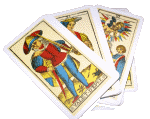
Haindl Tarot
SON OF WANDS IN THE EASTS - KRISHNA
The great epic, the Mahabharata, tells the story of Vishnu's incarnation as Krishna. In a central scene in that massive poem, Krishna tells the warrior Arjuna of the truth of the eternal soul. This passage, known as the Bhagavad Gita, has become a central text of Hindu belief, sometimes compared to Christ's Sermon on the Mount. Though the setting is a battle, its emphasis on duty and fulfillment helped inspire Mohandas Gandhi to develop the doctrine and practice of nonviolent resistance to oppression.
Though Vishnu came to save the world he became fully human as Krishna. He provides Hindu tradition with an image of the developed man. He is playful, lusty, a lover of tricks and music as well as women. These qualities, together with a childhood among the common people, have made Lord Krishna the most beloved of Hindu Gods. And yet, in the middle of his ordinary humanity he never loses his divine origins. One of the stories tells of Krishna's habit as a child of stealing food set out by the local women. When the women complained to Krishna's mother, she called him in and asked if he'd eaten any of the neighbors' food. He put on his most innocent face and told her that he would never do such a thing, that she could look in his mouth and she'd see no trace of food. He opened his mouth. But when she looked in she saw the sky at night, the planets, and the stars. The vision became vaster and vaster, and terror took her as she lost sight of the Earth, of herself, as the immensity swallowed her and she realized she was nothing. And then Krishna took pity on her and restored the illusion of her body, her home, her little son standing with his mouth open. She didn't see any bits of food, she told him, but she didn't want him causing any trouble. And she sent him out to play.
In this story we not only see the trickster Krishna (qualities also found in the Greek God Hermes), but also one of the great themes of Indian myth, the universe as a game in which even the Gods play their roles. In Krishna's speech to Arjuna the idea deepens to a profound message. Arjuna faces battle with his own cousin. How can he go on and fight, he asks his chariot driver, Krishna. How can he kill? Krishna tells him that the body does not matter. Only the soul is eternal, going on forever.
Despite Krishna's service as a warrior, we see him more often as a lover of life. Many pictures show him surrounded by dancing women. Erica Haindl compares him to Dionysus, the Greek God of ecstasy. Krishna is feminine, a quality admired in Indian art. This androgynous ideal will startle many Western people. It belongs, however, in the Tarot, which teaches the merging of polarities.
In the picture we see Krishna in motion, playing his flute. This contrasts with Radha, whom we saw at rest. In traditional symbology the male represents action, the female stillness. We also see three-quarters of Krishna's body, in contrast to just the head and shoulder of Radha. This emphasizes sensual qualities for the male and mental for the female, a reversal of our usual view.
The poems always describe Krishna as dark and Radha as light. In pictures Krishna appears as blue, perhaps symbolizing the sky or the sea. He wears a red and green stone, symbols for Fire and Earth, as basic a polarity as Fire and Water.
Krishna plays the flute, bringing the divine music into physical reality. Like the Western Hermetic tradition, the culture of India recognizes five elements, which it links with the five senses. The fifth element (after Fire, Water, Air, and Earth) is Quintessence, or Ether, and belongs to sound. Ether is the element of the Major Arcana, the "fifth suit:" The symbol for Quintessence is a dot. A dot signifies zero, or the Fool, the quintessential card of the entire Tarot.
DIVINATORY MEANINGS
In readings, Krishna means someone who loves life, especially its sensual sides. He has a great interest in the arts and may be a performer of some kind. If not, he still looks at life as a performance, which he acts out with great style and elegance. He is a trickster, a lover of jokes. He can be serious, and is certainly loyal, especially to those closest to him. But even in his most dedicated moments, he will keep his sense of life as a game.
Sensual, physical, open, he attracts lovers. In a reading, if the card represents a (heterosexual) man, he genuinely loves women. He does not see sex as a means of proving himself, but rather as simple joy. If the card indicates a woman, she is very free sexually. The Krishna person will have many admirers, perhaps many partners, but he does not trifle with people. Others, however, may find it difficult to take him as he is. They may long to play Radha to his Krishna, even if someone else has taken the role.
REVERSED
When we think of the Son of Wands reversed, we may find it hard to imagine anything suppressing such a joyous personality. We can think of the reversed card as a testing. Some difficult situation, some unhappiness or conflict, requires the person to look at life more seriously. This may bring out unexpected depths in the person. Those who considered his love of play as shallowness may be surprised at his strength and single-mindedness.










